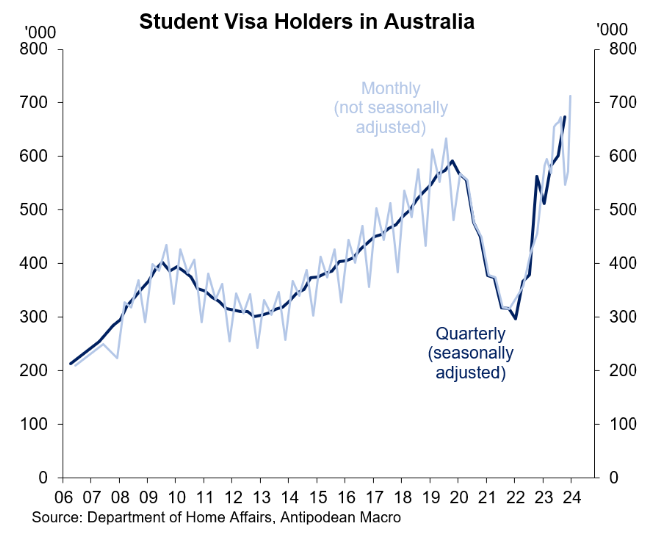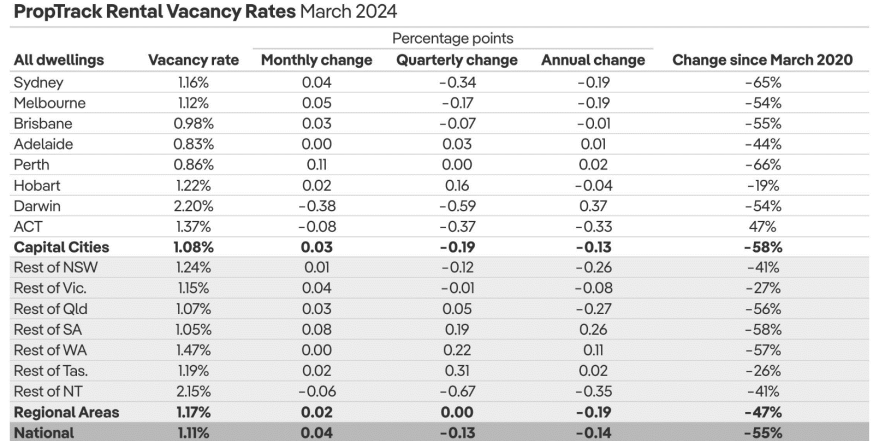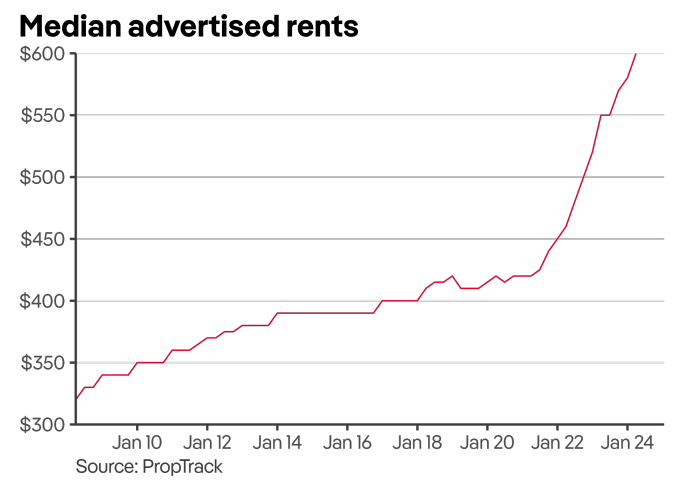The Department of Home Affairs reported that there were a record 713,144 international students in Australia at the end of February 2024:

It was reported last week that more than 80% of international students in Australia reside in the private rental market:
“Universities have built enough dorm rooms to accommodate only 40,000 students nationally – a fraction of the 205,000 international students they have enrolled to study in Australia this year, while private training colleges have failed to provide any accommodation, even though they have accepted 149,000 foreign students this year”, The Australian reported.
“Universities benefit significantly from international students, and they have a responsibility to help house them’’, Federal Education Minister Jason Clare said.
This record surge in international students has helped to halve Australia’s rental vacancy rate:

It has also driven median advertised rents up by 38% since the start of the pandemic:

With pressure building on the Albanese government over the rental crisis, Labor is reportedly looking to increase student visa application fees, as well as hard caps on numbers:
“Sector insiders say the May budget will almost certainly include a big increase in visa application fees of many hundreds of dollars, but that it is unlikely to be as high as the $2500 fee advocated by the Grattan Institute earlier this year”, The Australian reports.
As usual, lobbyists for the international education sector are pushing back hard.
“We’d oppose anything above a CPI increase because it will make us globally uncompetitive”, Phil Honeywood, chief executive of the International Education Association of Australia, said.
Honeywood also argued that capping numbers would be a blunt instrument in an environment where numbers were already levelling off.
Immigration influencer Abul Rizvi also opposes change.
“Extracting more money from foreigners and gifting it to poor Aussies is always going to be electorally popular”, Rizvi said.
“But it means that the best students, who have the most choices about where to study, would likely choose other nations over Australia”.
However, Brendan Coates from the Grattan Institute made much more sense, arguing that higher application fees would deter lower-quality students from applying.
“Every migrant contributes something to Australia, but some students contribute a lot more than others”, Coates said.
“If you are trying to get numbers down, the most obvious place to start is to target the less valuable students who are studying less valuable – shorter and cheaper – courses and who are much less likely to ever transition to a permanent visa”.
Raising application fees for international students is a good policy.
Universities are currently ‘clipping the ticket’ and earning economic rents from Australia’s immigration system via student fees.
Australian universities are non-profit entities that do not pay taxes (unlike other ‘export’ sectors). This is despite universities operating like corporatised, profit-maximising firms.
Lifting application fees would ensure that Australians gain a financial benefit from the international student trade, much like a sovereign wealth fund receives revenue from mineral exports.
The Albanese government should go much further and effectively cap numbers by ensuring that only the highest quality students apply.
Increased (and enforced) financial thresholds for admission, a further tightening of English language requirements, a restriction on in-semester work hours, and a restriction on post-study employment rights to only the most qualified graduates are all ways to achieve this.
The government should also make universities liable for housing their international students.
For example, the government should require institutions to provide on-campus housing for at least half of their international student population.
Therefore, if universities and colleges want to increase their overseas student enrolments, they must provide more on-campus housing.
Such a policy would limit international student numbers (and net overseas migration) and relieve strains on the private rental market, creating a win-win situation.
In short, the international education system must be overhauled to balance the costs and benefits for universities and Australians.
Requiring universities to provide on-campus accommodation proportionate to the number of international students enrolled and raising fees for international students are policy no-brainers.

